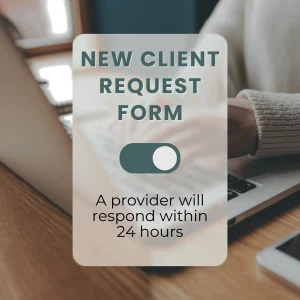Understanding Type A Personalities & The Benefits of Therapy
Are you always in a hurry, highly competitive, and constantly striving for perfection? You might have a Type A personality. While these traits can drive success, they can also lead to stress and burnout. In this blog, we’ll explore how therapy can help individuals with Type A personality manage their traits, reduce stress, and improve their overall quality of life.
Having a Type A personality often means you’re driven, ambitious, and constantly on the go. While these traits can be advantageous in many aspects of life, they can also come with a hefty price tag—namely, high levels of stress, anxiety, and potential burnout. If this sounds like you, therapy might just be the solution you need to find balance and enhance your well-being. Let’s dive into the characteristics of Type A personality and how therapy can help manage its challenges.
What Are Type A Personalities?
Type A personality is characterized by traits such as high levels of competitiveness, a sense of urgency, impatience, and a strong drive for achievement. People with Type A personality often set very high standards for themselves and can be very hard on themselves when they fail to meet these standards. They tend to be workaholics, are often stressed, and may struggle to relax.
Common Traits of Type A Personaliies
Competitiveness
Time Urgency
Perfectionism
Always striving to be the best and comparing oneself to others.
Constantly feeling rushed and a need to accomplish tasks quickly.
Constantly feeling rushed and a need to accomplish tasks quickly.
Type A Impatience
Stress Prone
Easily frustrated by delays or when things don’t go as planned.
Higher likelihood of experiencing stress-related health issues.

The Challenges Faced by Type A Personalities
While Type A traits can lead to significant achievements, they can also result in various challenges:
Constant pressure to succeed can lead to chronic stress and anxiety.
Impatience and competitiveness can strain personal and professional relationships.
Overworking and not taking time to relax can lead to physical and emotional exhaustion.
High stress levels can contribute to health issues such as hypertension, heart disease, and sleep disorders.
How Therapy Can Help Type A Personalities
Therapy offers a supportive environment to address and manage the challenges associated with a Type A personality. Here are some key ways therapy can help:
Stress Management Techniques
Therapists can teach effective stress management techniques, such as mindfulness, meditation, and relaxation exercises, to help reduce overall stress levels.
Enhancing Interpersonal Skills
Therapy can improve communication and relationship skills, helping Type A individuals build healthier, more supportive relationships.
Improving Emotional Regulation
Therapy can help individuals develop better emotional regulation skills, allowing them to handle frustration and impatience more effectively.
Work-Life Balance
Therapists can work with individuals to establish healthier work-life boundaries, ensuring they take time for relaxation and personal activities.
Therapy may also help Type A personalities practice wellness based behaviors including…
- Relaxation Techniques
- Setting Realistic Goals
- Help with Prioritizing Self-Care
- Skills to Challenge Perfectionism-Thoughts
- Guidance on Practicing Communication Skills
Final Thoughts on Therapy for Type A Personalities
While having a Type A personality can drive you to achieve great things, it’s essential to find balance to avoid the pitfalls of stress and burnout. Therapy can be an invaluable resource in helping you manage your traits, improve your well-being, and lead a more fulfilling life. Remember, seeking help is a sign of strength, not weakness. Embrace the journey towards a healthier you.
My therapist has been a crucial help in my management of my OCD.
Since working with her I've eliminated nearly all of my avoidance behaviors, while also decreasing my daily distress significantly, as well as improving my relationship dynamics. She's the first therapist I've worked with who always leaves me feeling hopeful and in good hands after every session.

I just feel like a brand new person!
I look forward to the day now and i know that my therapist is still there- in my corner! If you need help with the challenges that life gives you, please don’t hesitate to make an appointment!

No matter the reason why you or a loved one might seek therapy, I give my very highest recommendation.
My therapists wisdom, compassion and insights make her one of the best, most gifted therapists I've experienced.

I know I'm growing emotionally & I feel stronger & better with each session.
Simply the best, a stroke of luck to have stumbled upon this practice & Rebecca. I appreciate the empathy, dedication, directness & flexibility more than I can put into words.

I’ve felt a marked difference in my overall emotional state since I started therapy.
I love working with my therapist. She really takes the time to listen to me and help me piece together my needs and coping strategies.

My therapist is fantastic.
I am receiving wisdom and insight in a nurturing and judgment free setting.

My baseline anxiety has significantly decreased since I started therapy.
I handle stressful situations with more grace than I previously did. I feel that I am able to be a better mother to my children and more confidence worker in my career.

Therapy has helped me to feel more confidence in myself
... and my ability to regulate my own emotions. I have been better able to reflect on my own thoughts and feelings and use my own self-awareness to better handle stressful situations in the future.

I have felt more confident in my abilities as a parent and a professional.
I was hoping to gain more self-confidence and build up my self-esteem, but I have also strengthened my abilities in other areas along the way

FAQ's About Therapy in New Jersey
How do I get started as a new client?
New Clients can reach out to us directly via call, text or email here:
Or, you can complete a new client form and we’ll reach out to you within 24 hours here:
What are your specialties?
Our therapists have dedicated their clinical work to specific niche areas. Check out our therapy service page here to learn about our areas of expertise
What type of therapy do you offer?
We offer traditional and non-traditional therapy
Traditional therapy, such as talk therapy incudes:
- Individual therapy
- Couples Counseling
- Family Therapy
- Cognitive Behavioral Therapy
- Emotion-Focused Therapy
Do you offer Ketamine Therapy?
Yes! Ketamine has shown promise in treating various mental health conditions, including PTSD, Anxiety, Depression, Phobias and OCD. As Ketamine therapy providers, we offer this service to help clients break cycles of thinking traps that lead to compulsive behaviors.
Is Online Therapy As Effective As In-Person Therapy?
Online therapy is essentially face-to-face counseling, just conducted remotely. Studies show that teletherapy is as effective as traditional counseling. Professional organizations and state governments recognize its benefits and have set regulations for it. However, like any therapy, its success in achieving your goals isn’t guaranteed. It’s important to discuss with your therapist whether teletherapy is working for you.
What age groups do you serve?
Currently, we work with New Jersey clients ages 10+
Do you offer traditional talk therapy?
of course! though we have some unconventional therapy approaches, we are rooted in evidenced based practices. Talk therapy is a major player in the therapy room! See What we Treat and Integrative Services for more information
What Geographic Areas Are Served?
Currently, we serve clients in New Jersey and are expanding to other states as telehealth laws evolve. While telehealth offers the convenience of attending sessions from anywhere, state laws require clients to be in-state during their session.
Does my insurance cover my visits?
We provide”Courtesy Billing” for clients who are using the Out-of-network insurance benefits.
Our Insurance Page shares a small blurb about Why We Left Insurance Panels
Can I Change Therapists If I'm Not Happy?
Yes, you can switch therapists to another provider within the practice, or we can provide you a referral if preferred. We want to ensure that your time and effort are well spent, and that you are getting the relief you need, that’s why we work collaboratively with each other in the practice, as well as outside therapists who we know and trust.
What is your cancellation policy?
We ask that clients provide at least 24 hours notice in the event that they need to cancel to avoid the 50% cancellation fee. we understand that life happens and do our best to be flexible & reschedule.
How Do I Know If Therapy Is Helping?
You should feel like you’re making progress. Signs it’s working include:
Feeling comfortable talking to your therapist
Your therapist respects boundaries
You’re moving towards your goals
You feel listened to
You’re doing better in life
Your self-esteem is getting better
Is Online Therapy Easy to Use for Non-Tech-Savvy People?
Yes, it’s pretty simple to access sessions. You’ll need basic internet skills, such as opening and visiting the patient link sent to you via email. It’s similar to video chatting like Facetime or Zoom. We can also walk you through it on the phone the first time to ensure a strong connection
What Questions Should I Ask My New Therapist?
Feel free to ask anything. Some good questions are:
- How often will we meet?
- What do you specialize in?
- What experience do you have with my issue?
- What outcomes can I expect?
- How will I know I’m progressing?
- How long do you usually work with clients?
- How will we set my treatment goals?
How Should I Prepare for My First Session?
Showing up is all that you need to do! But if you really want to get the most out of session, it could help to take some time to think about what you want from therapy. It helps to write down your goals, questions you have or things that you feel are important to share.
What is the difference between associate therapists & fully licensed therapists?
Our Qualifications:
Our founder, Rebecca Sidoti, is a highly qualified, state-licensed therapist and supervisor with extensive training in anxiety related disorders and innovative treatment such as Ketamine Therapy. Mind by Design Counseling adheres to standards set by the our governing counseling boards.
To see each providers credentials, training and licenses, visit our “Meet the Therapists” Page to learn more.
- LAC/LSW are therapists who may practice clinical work under the supervision of a fully licensed therapist.
- LPC/LCSW are therapists who have completed the necessary clinical hours post-graduation under supervision and can practice clinical work independently.
Is Virtual Counseling Suitable for Everyone?
Online therapy might not be as effective for individuals with chronic suicidal thoughts, severe trauma, significant mental health history, or those recently in intensive care. Such cases often benefit more from traditional, in-person counseling. We’ll help you decide if our online services are right for you during your intake and evaluation.
What Equipment is Needed for Online Therapy?
To join a session, log in using the credentials we provide. No downloads are needed. Our platform, compatible with both individual and group sessions, requires:
A computer or mobile device with a webcam and internet access.
We’ll help you test your setup before your first appointment to ensure a reliable connection. iOS users should use the Safari browser for mobile and tablet sessions.
What Questions Will Therapists Ask Me?
It depends on your goals. Expect questions about your thoughts, feelings, relationships, work, school, and health. They’ll ask to understand your therapy goals.
How Do You Keep Client Information Secure?
Security and Confidentiality of Sessions:
Your privacy is crucial to us. We use TherapyNotes, a HIPAA-compliant platform, ensuring secure and confidential teletherapy sessions. This platform’s security features include encrypted video connections, secure data transfers, and encrypted databases, ensuring your information is safe at all times.
What is VRT used for?
we use VRT to support Exposure Therapy, a long standing traditional therapy modality to treat phobias, anxiety and stress. we send a headset directly to your home so you can access VRT from anywhere.
VRT not only helps with exposure therapy for phobias, but is great for ADHD, mindfulness, PTSD and social anxiety.






